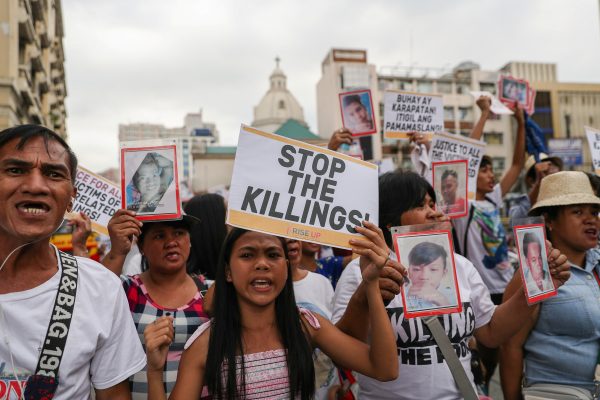But the gruesome deaths of Ramos and Lucana hardly registered on the national consciousness. They barely made the news, featuring only in rundowns of recent drug-related crimes in the capital.
The Philippine media has not abdicated its responsibility to document Philippine President Rodrigo Duterte’s ‘war on drugs’. But it is evident that drug-related reporting has taken a backseat to other issues, including the recent ongoing global concern over the COVID-19 outbreak. Media outlets have stopped counting the number of killings and no one knows the full extent of what some scholars are calling a genocide.
To some degree, this reflects the public’s desensitisation to the crisis that started just months after Duterte took office.
These killings are known as ‘Oplan Tokhang’, a bloody anti-drug campaign that is both the symbol and substance of Duterte’s government. They persist despite acknowledgement from government officials that their ‘drug war’ has been a failure, even on the basis of reducing drug supply.
The President himself vacillates between admitting and denying the failure of his campaign promise to eradicate illegal drugs within three to six months. Apparently leaning towards the former, he offered Vice President of the Philippines Leni Robredo the post of chairperson of the Inter-Agency Committee on Anti-Illegal Drugs. Robredo, whom Duterte and his allies have regularly bullied since the current administration began, eventually accepted the offer.
Duterte dramatically sacked her less than three weeks later, but Robredo’s brief tenure as ‘drug czar’ was still enough for her to compile a 40-page report that she published in 2020. The report’s main point was expected: Duterte’s ‘war on drugs’ has been a massive failure.
Beyond its political implications, Robredo’s report offers a glimpse into what drug policy might look like under a less punitive government. In the report, Robredo calls for strategic leadership on drug policy, a more reliable database (for instance, in identifying the number of drug dependents in the country), greater emphasis on drug prevention and rehabilitation, strengthening ‘supply constriction’ and putting an end to the ‘drug war’ altogether.
Harm reduction advocates feel that positions like Robredo’s do not represent a much-needed paradigm shift. ‘While we certainly welcome an end to the drug war, most supporters and critics of the government alike think of drugs as the problem and people who use drugs as necessarily problematic. This is a problem in itself, as it does not reflect the realities on the ground’, Inez Feria, Director of NoBox Transitions Foundation (Philippines), tells us. She adds that these views pave the way for policies like mandatory drug testing while delegitimising the voices of people involved in drugs.
But the increased attention to drug issues has also encouraged drug-related advocacy and scholarship. ‘People have started talking more about drug use and drug policy’, Cathy Alvarez, a human rights lawyer, recently told Filter Magazine. ‘We are working with organisations to help increase the voices of people who use drugs in places where decisions are being made. It sounds impossible now, but we are starting to plant those seeds’.
The singular focus of the ‘war on drugs’ on shabu (methamphetamine) has also given advocates some space to push for the legalisation of cannabis, at least for medical purposes. While the current political environment remains hostile to proposals like drug decriminalisation, at least two lawmakers, Senator Risa Hontiveros and District Representative Jose Christopher Belmonte, have filed bills that embrace the principles of harm reduction.
Academic research on drug related-issues, while still limited, is at an all-time high. And artists have contributed to the popular discourse — Sandata’s ‘Kolateral’ is a 12-track rap album centred on the experiences of victims of the drug war.
While the national government uses tough anti-drug rhetoric, both local government units and national agencies remain open to alternative approaches. Given the right political climate, the Philippines could see a humane, evidence-based drug paradigm. One key agency with the power to be decisive is the Department of Health. While mandated to take the lead in setting drug policy, it has yet to be more forceful in reframing drugs as, in the words of Robredo, a ‘medical and sociological issue’.
Today, the priority for those who are concerned is to put an end to the killings, ensure the welfare of affected families and communities and document the experiences of today’s regime for the future. But while it is tempting to think that the killings will end with Duterte, the fact that punitive drug policies, including disproportionately-harsh jail sentences and forced rehabilitation, have been in place for decades means that more fundamental reforms are needed. These include amending laws and changing people’s deeply ingrained attitudes towards drugs and the people who use them.
These attitudes, after all, enable politicians like Duterte to use ‘drug wars’ as populist tropes and in turn, their rhetoric perpetuates misinformation and prejudice. Nothing less than a paradigm shift will help turn the tide against these attitudes and the policies they lead to.
Gideon Lasco MD is a Senior Lecturer at the University of the Philippines Diliman and a Research Fellow at the Ateneo de Manila University’s Development Studies Program.
Vincen Gregory Yu MD is a physician and writer based in Manila.

